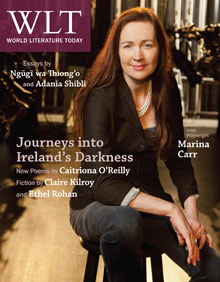Fun with Your New Head: Getting into SF
"Science fiction works differentially from other written categories, particularly those categories traditionally called literary. . . . It has its own particular ways of making sense out of language. To ignore . . . these constitutes a major misreading—an obliviousness to the play of meaning that makes up the sf text." — Samuel R. Delany, “Some Presumptuous Approaches to Science Fiction” (1968)
Many a smart, literate newcomer to sf has tackled some seminal book, say, William Gibson’s Neuromancer (1984), only to abandon it, baffled and frustrated. Why? Samuel Delany’s insight parses the problem; this excerpt, the opening of Gibson’s Count Zero (1986), illustrates it:
They set a slamhound on Turner’s trail in New Delhi, slotted it to his pheromones and the color of his hair. . . . Its core was a kilogram of recrystallized hexogene and flaked TNT. [. . .]
Because he had a good agent, he had a good contract. Because he had a good contract, he was in Singapore an hour after the explosion. Most of him, anyway. [. . .]
It took the Dutchman and his team three months to put Turner together again. They cloned a square meter of skin for him, grew it on slabs of collagen and shark-cartilage polysaccharides. They bought eyes and genitals on the open market. The eyes were green.
Readers who, upon encountering something like this, find themselves more intrigued than irritated often come to someone who has read sf for decades, asking for directions “into sf.” Happily, sf has by now accreted a considerable secondary literature: history, bibliography, criticism, that sort of thing. Unhappily, most of it is useless to newcomers.
Riding to the rescue of beleaguered readers is the curious publishing phenomenon of the “Companion to science fiction.” Cambridge has one. So does Blackwell. Oxford’s is in the works. The latest is from Routledge.
“Companion” evokes cozy feelings: my companion, my helper, my pal. Such evocations ill suit The Routledge Companion to Science Fiction (2011; ed. Mark Bould et al.). This is a book with an identity crisis: its four parts actually constitute two books, the audiences for each being all but mutually exclusive. Book 1 (chaps. 1–18 and 45–56; 244 pages) consists of expert historical perspectives on sf, its subgenres, and its presence in a medley of “media” (fiction, film, comics, television) and “material practices—toys, games, environments . . . tourism, dime museums, and world’s fairs.” Book 2 (chaps. 19–44; 265 pages) focuses on academic sf scholarship in equally expert essays about multifarious critical practices (feminism, postcolonialism, cyborg theory, animal studies, and so on).
The trouble is, books 1 and 2 are incompatible. Most essays in book 1 will be useful to readers who want to learn about sf in popular culture. Such readers, however, will likely be put off by the essays in book 2, most of which—in dense, often jargon-laden prose—exhort current and future academics to apply this-or-that critical theory to sf. Such academics, however, will already know most of what’s in book 1 and may be put off by the very lack of critical rigor and terminology that makes book 1 accessible to nonacademics.
Worse, by choosing to devote so much space to so many cultural forms and critical theories, the editors sacrifice all but the most cursory indications that sf even exists outside of “the US, the UK, and, to a lesser extent, Canada and Australia.” Lack of attention to non-anglophone works, which also impairs the companions from Cambridge (2003; ed. Edward James & Farah Mendlesohn) and Blackwell (2005; ed. David Seed), ill serves readers because it misrepresents sf. It’s not as though experts on sf from other countries don’t exist: the third edition of Neal Barron’s Anatomy of Wonder (1987), for example, included comprehensive essays on sf from Germany, France, Russia, Japan, Denmark, Sweden, Norway, Holland, Belgium, Romania, Yugoslavia, and Israel. Maybe Oxford’s forthcoming companion will get this right.
Happily, sf has by now accreted a considerable secondary literature: history, bibliography, criticism, that sort of thing. Unhappily, most of it is useless to newcomers.
The caliber of the essays in the Routledge Companion is so high that anyone seriously interested in sf will want to peruse this book. For readers like me, who relish both informal and theoretical essays about sf, it’s a worthwhile investment. Others will likely find it a pricey, often off-putting tome.
•
Another way into a literary mode is to track its evolution. All the companions gesture in this direction, by devoting essays to key eras in the development of sf. But there’s nothing like a full-throated history.
The literary history of written sf is as fascinating as it is complex. Since sf’s codification as a storytelling mode in the late nineteenth century, it developed—always buffeted by editorial practices and market forces—through ongoing dialogues within its community of writers, editors, critics, and readers; cross-fertilization with the realist literary mainstream; and imaginative engagement with extraliterary developments: social, cultural, political, ideological, and, above all, scientific and technological.
Unsurprisingly, no single context or approach can accurately frame or describe this dynamic growth. Yet that is what co-authors Mark Bould and Sherryl Vint evidently set out to do in The Routledge Concise History of Science Fiction (2011)—their context being ideological, their approach being hindsight.
A great deal of this book is mere plot summary, replete with spoilers, of works, some of which were important to the development of sf, many of which were not. Overall, the balance is off. The authors allocate far more space to historically inconsequential writers such as Leslie F. Stone and George O. Smith than to, say, Brian Aldiss, Alfred Bester, Anne McCaffrey, or Zenna Henderson, all of whom were instrumental in shaping modern sf.
The authors’ commentary on summarized stories and novels typically amounts to little more than ideological critique (or praise) based on current attitudes about race, ethnicity, sexism, and other hot-button issues.
Now, most sf is inherently political, so addressing its ideological content is appropriate—but not to the exclusion of all else. So narrow a context distorts the story this book ostensibly tells. It marginalizes, for example, much of sf’s engagement with its core concern: how technological change, the dominant feature of modernity, has affected our sense of self, our ongoing struggle to define what it means to be human. A chronological sequence of ideological judgments, however valid, awash in plot summaries does not a history make.
•
Surely the most quixotic recent publishing venture is Oxford’s series of “very short introductions.” Pocket-sized paperbacks—over three hundred published to date—of roughly 150 pages each (including figures), they offer bite-size infodumps for the time-challenged intellectual about such topics as angels, galaxies, languages, reality, and the history of life (!). Having read many of these nuggets, I’ve come to appreciate how the parlous union of a preposterously broad topic and absurd length restrictions can spawn books for which “very short” turns out to be a euphemism for “too cursory to be of value.”
Now we have David Seed’s Science Fiction: A Very Short Introduction (2011). As though insufficiently challenged by trying to cover over a century of written sf, Seed announces that he will also focus on “SF’s twin medium—the cinema.” Then, against all odds, he pulls it off. Almost.
Shrewdly organizing his material by iconography and story type (spaceships and space voyages, aliens, utopias and dystopias, and so forth) and eliminating rebarbative academic jargon and all literary theory, Seed stitches together minimal plot sketches of carefully selected works with astute insights, sharp asides, and appropriate commentary (some ideological)—markers of one who has read widely and thought deeply about sf.
These virtues make all the more depressing the excrescence of errors—typographical and informational—that all but scupper this enterprise. Caveat lector: trust Seed’s insights but not his data.
•
Recommendations? The book about sf to read if you’re reading only one: Science Fiction in the Twentieth Century (1994). With effortless elegance, Edward James guides readers who know little about sf through its evolution, first as a genre, then as a breakout interloper in the mainstream of fiction; introduces them to the literarily influential communities of sf (fandom); and offers them strategies for reading sf. The latter are essential—as Delany puts it: “The play of meanings . . . that makes up the SF text is organized in a way radically different from that of the mundane text (from mundus, meaning the world; stories that take place on Earth in the present or past). . . . Practically any rhetorical figure operates differently in an SF text from the way the same, or similar, figure would operate in a text of mundane fiction.”
Even if you’re not interested in reading sf, you may want to explore the interface between sf and the world. Why? Because, writes Thomas M. Disch, “science fiction has come to permeate our culture in ways both trivial and/or profound, obvious and/or insidious.”
Want a history? Seek out Billion Year Spree by Brian W. Aldiss (1973). Written by one of the most influential twentieth-century sf writer-critics, it’s perceptive, witty, and engaging—qualities that somehow got diluted in its more up-to-date but tedious successor Trillion Year Spree (1986, with David Wingrove). Want the rest of the history along with in-depth looks at various kinds of sf? Your best bet is The Cambridge Companion to Science Fiction (2003; ed. Edward James & Farah Mendlesohn), which in 2005 won a Hugo, an award voted annually by readers.
Even if you’re not interested in reading sf, you may want to explore the interface between sf and the world. Why? Because, writes Thomas M. Disch, “science fiction has come to permeate our culture in ways both trivial and/or profound, obvious and/or insidious.” Reams have been written about this topic—some insightful, much impenetrable, and a bit that’s downright silly. But the most acute and accessible to readers, whether or not they’ve read much sf, are by two of the best writers, Disch and Norman Spinrad.
In The Dreams Our Stuff Is Made Of (1998), Disch undertakes to provide “a key to the allegories of science fiction and chronicles the genre’s impact on American and, eventually, global culture.” Hung on a roughly chronological frame, Disch’s astringent analysis ranges from the culture of sf (fandom) to sf as an often-contested infiltrator in mainstream culture. The measured ferocity of Disch’s insights is compelling from the outset: “America is a nation of liars, and for that reason science fiction has a special claim to be our national literature, as the art form best adapted to telling the lies we like to hear and to pretend we believe.”
While Disch looks outward (he subtitles his book How Science Fiction Conquered the World ), Spinrad, in the essays in Science Fiction in the Real World (1990), looks inward, offering readers a warts-and-all glimpse of the life and concerns of a working sf writer, a “revisionary examination of where we are and how we got there,” and a “hologrammic and nonsequential outline of the evolution of science fiction from the 1950s into the 1980s” via essays on four writers that shaped sf during that period.
Still, none of these books can substitute for reading sf. Delany again: “Like most languages, the SF language is best learned . . . by exposure.” Where to start?
If you want an engaging guide to the (English-language) sf novel, I know of none better than David Pringle. In Science Fiction: The 100 Best Novels (1985), Pringle does for sf what Anthony Burgess did for the English novel in 99 Novels: The Best in English Since 1939 (1984). Like Burgess’s, Pringle’s brief essays are perceptive, opinionated, and carefully create necessary context. His subsequent, wildly ambitious book, The Ultimate Guide to Science Fiction (2d ed., 1995), is chockablock with mini-essays on around 3,500 books (!). Anyone who isn’t seduced by at least a few dozen of Pringle’s entries should probably seek literary sustenance beyond the fields of sf.
The importance of novels notwithstanding, sf authors have always introduced and refined new ideas, themes, and ways of telling stories in shorter forms. Since 1953 readers have voted Hugo awards to fiction they consider the year’s best, and the series of anthologies The Hugo Winners (1962, 1971, 1994, 1997) represent their view of the finest short fiction the field has produced. The Science Fiction and Fantasy Writers of America, a professional organization, began voting the similarly intended Nebula awards in 1966, and annual collections of nominated and Nebula-winning fiction have appeared ever since. To complement these, SFWA members chose the best short stories and novellas published before 1965 and have generated the multivolume Science Fiction Hall of Fame (1971, 1974, 1982, 1986).
But the best of all possible ways into sf is to read it in the company of a savvy, lucid expert. In 1970 sf author Robert Silverberg organized a cadre of commentators (mostly, other sf writers) to elucidate thirteen first-rate stories from 1897 through the late 1960s. Silverberg’s The Mirror of Infinity was, for me, a revelation; it changed forever how I thought about sf. In 2010 a worthy successor finally appeared: The Wesleyan Anthology of Science Fiction (see WLT, Sept. 2011, 68). Editors Arthur B. Evans, Istvan Csicsery-Ronay Jr., Joan Gordon, Veronica Hollinger, Rob Latham, and Carol McGuirk provide insights into the nature, history, and reading of sf via commentary on fifty-two exemplary stories. Now that’s a companion to cherish.
Norman, Oklahoma
Editorial Note: For a browsable reading list of Morrison's sf recommendations, see our web exclusive piece "Fun with Your New Head: Science Fiction Reading List."












